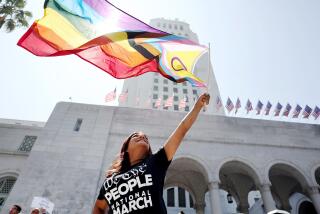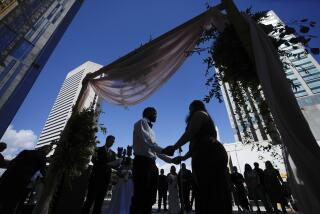California, West lead U.S. in interracial marriages, report finds
- Share via
California and the Western United States are leading a nationwide surge in interracial marriage, according to a new study that paints a picture of a broadly diversifying nation, one where color lines are blurring and old taboos fading.
One-fifth of all recent weddings in the western United States were between people of different races or ethnicities, said a report being released today by the Pew Research Center. Nationwide, 15% of recent marriages were interracial, researchers found.
“In the space of half a century, intermarriage has evolved from being illegal to taboo to being merely unusual, and with each passing year, much less unusual than it used to be,” said Paul Taylor, director of Pew’s social and demographic trends project, which produced the study.
Once outlawed in many states, marriages across racial or ethnic lines now make up about 1 in 12 of all existing unions in the U.S., or about 4.8 million couples, the study found. The change has been helped along by growing public acceptance of such relationships, especially by young people, and by rising numbers of Asian and Latino immigrants, the researchers said.
Nationwide, the study, based primarily on an analysis of recent and historic U.S. Census data, found that a record 8.4% of all current marriages are between spouses of different races or ethnicities, up from about 3% in 1980.
The trend is most pronounced in Western states, including California, where waves of immigrants have helped broaden the pool of prospective spouses. Hawaii was most likely to have couples who “married out,” with about 4 in 10 of the state’s newlyweds between 2008 and 2010 marrying outside their racial or ethnic group. In California, which ranked sixth in the listing behind several of its Western neighbors, more than 23% of recent marriages were across such lines.
Overall, Latinos and Asians were most likely to marry outside their race or ethnicity, the researchers found. More than a quarter of those in each group who wed in 2010 married someone of a different race. That compares with about 17% of blacks and about 9% of whites, although because whites are by far the largest racial group in the U.S., most intermarriages of all kinds included a white spouse.
“This shows a continuing breakdown of racial barriers or boundaries in the U.S,” said Daniel Lichter, a sociology professor at Cornell University. “But I don’t think it means we’ve moved to a post-racial society. The vast majority of marriages in this country are still within a single race.”
Still, he said, the trend seems likely to continue, with today’s young people having greater opportunities than previous generations to interact equally with one another in schools, neighborhoods and the workplace.
The report also included data from several recent Pew surveys showing growing public acceptance of marriages across racial and ethnic lines, 45 years after the Supreme Court declared all remaining state bans on such marriages unconstitutional. For example, more than 80% of those who responded to a Pew survey in 2009 said they agreed with the statement that it was “all right for blacks and whites to date each other,” up from 48% in 1987.
That’s a welcome change to Chula Vista residents Amy Wise, who is white, and her husband, Jamie Wise, who is black. Married 19 years, the couple has one daughter, Tatiana, 17, but life has not always been easy, said Amy Wise, who chronicles her interracial family in a blog. Her husband’s family is now very loving to her, but “it was years before I was accepted,” she said. “That was a rough road.”
Also rough have been the periodic negative comments or mistaken assumptions the couple still encounters, Wise said. “We live in San Diego, for goodness sake, but we still have issues sometimes, and that really just blows my mind in 2012.”
More to Read
Sign up for Essential California
The most important California stories and recommendations in your inbox every morning.
You may occasionally receive promotional content from the Los Angeles Times.










